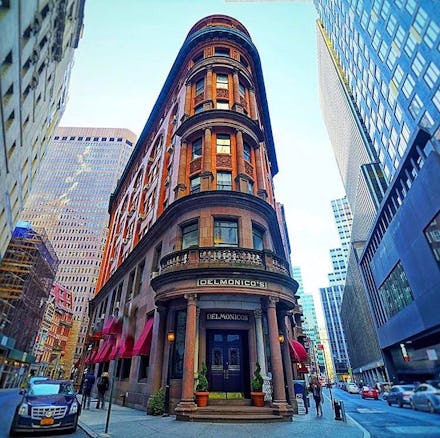150 years ago, a group of women fought the patriarchy by eating lunch at this NYC restaurant

Before one fateful day in the spring of 1868, the kind of woman who’d dare to dine in public without the accompaniment of a man was widely assumed to be a sex worker. But on April 20, 1868, journalist Jane Cunningham Croly, who was tired of being excluded, compelled a group of women to join her at Delmonico’s in New York City, a restaurant that, even at that time, was deemed iconic and reserved for the societal elite.
Before the groundbreaking event could happen, Croly had to ask the restaurant’s proprietor, Lorenzo Delmonico, to break social expectations and permit the ladies to lunch. “The [Delmonico] brothers were progressive in their thinking from the start,” the restaurant’s special events director Carin Sarafian said in a phone interview. Beyond hosting the first public meal where women were permitted to dine without men, Delmonico’s was one of the first restaurant’s to employ a female cashier, Sarafian said.
Even the food at Delmonico’s was ahead of its time: The restaurant was among the first to introduce farm-to-table dining in the United States. Originally from Switzerland, the Delmonico family was used to an accessible array of fresh produce. The fruit and vegetable scene in New York was not up to snuff, so they purchased a plot of land now located in Williamsburg, Brooklyn, where they started their own farm. “They were able to serve things that weren’t yet available in the U.S. — like avocados and eggplant,” Sarafian said.
The ladies’ lunch was monumental not just because it marked one of the first times a group of upperclass women dined out without male chaperones; it was also the first official meeting of Sorosis, the women’s club Croly founded to contest the sexism deeply ingrained in society. “Croly was so infuriated by the treatment that she was given, she organized her co-workers into a press club of their own,” Sarafian said.
By today’s measure, her outrage was warranted. The impetus for the women’s lunch was sparked when Croly, a member of the New York Press Club, was prohibited from attending the dinner being thrown by the club to honor Charles Dickens, who was touring at the time. The club initially excluded women — who, remember, still couldn’t vote at the time — from the event entirely, but relented somewhat after Croly’s persistence.
Women could attend Dickens’ dinner of honor, which was being held at Delmonico’s, under the condition that “they must sit behind a curtain, unseen by the gentlemen in the audience and unseen, as well, by the guest of honor, Mr. Dickens,” author Catherine Gourley wrote in Society’s Sisters. Croly was not about to sit behind a curtain to hear a man talk about himself; she refused to attend and instead hosted a better party. As Gourley wrote, Croly said, “We will form a club of our own. We will give a banquet to ourselves, make all the speeches ourselves and not invite a single man.”
Sorosis, which is defined as a fruit with many blooming seeds and comes from the Latin word for sister, was one the first American women’s clubs and was dedicated to women’s self-improvement. “Sorosis would help women to bloom by presenting lectures and discussions on the arts and education,” Gourley wrote. “Sorosis would teach women to think for themselves, rather than getting their opinions from their husbands and fathers. Croly admitted the idea was not only new, ‘It was startling.’”
After the first meeting on April 20, the women of Sorosis visited Delmonico’s routinely. “It became their meeting place to exchange ideas around politics, history and the world. It was a place to be with other women,” said Sarafian.
On Friday, Delmonico’s will commemorate the 150th anniversary of the inaugural luncheon by hosting a lunch exclusively for women. Guest chef Gabrielle Hamilton of the New York City restaurant Prune will serve her rendition of one of the original menus from Delmonico’s.
“The event is not a political event. It’s really a celebration of women and females being together,” Sarafian said. “But it also is meaningful because of this particular anniversary.” It’s a fitting moment — women’s empowerment was very much at the forefront of social issues 150 years ago, as it is today.